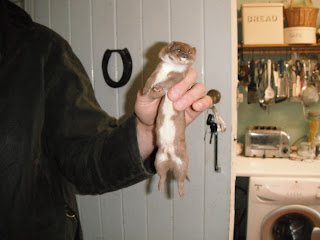I should say harvesting wild animals for the freezers, plural, as we have two - both of which are only a quarter full. We've nearly eaten all our home grown chickens, lots of venison, most of last year's game birds, plus half a pig I got from Peggy in exchange for helping her in the butchery.
Summer shouldn't be the hungry season, but the main crops of vegetables aren't ready to harvest yet. After a hot dry spring, we're being subjected to a cold grey summer. My hardy root vegetables like potatoes, parsnips and carrots are stalwart growers. My squash, french beans, and sweetcorn are sulking in their rows.
Last winter's lambs are going to the abattoir next week. I have one ram lamb destined for our freezer and the other two are sold to neighbours. I just got my all-clear from Trading Standards to sell our lamb and chickens direct (Milkweed Farm Meat) so I can now supply any surplus meat to local families and businesses. I'm a quasi-CSA of one.
Assuming I have any meat to sell by next week. I have had to bring a pair of wire cutters on my sheep checking rounds. One of the ram lambs keeps getting his fat head wedged in the wire fencing. I've found him stuck fast, dejected and hungry, for the last three mornings in a row. Did he learn his lesson this morning?
Winning at grazing
Nope. Apparently the grass really is greener on the other side of the fence. At least until you eat everything in reach, get stuck, and have to wait for someone to cut the wire and free your head.
Eunice keeps him company, or stands there and mocks him, I'm not sure which.
It's become a daily thing with him. Even the neighbors have started helping to free him when they find him before I do.
I also lost my first sheep since starting the flock. The smallest orphan lamb died in his first week, probably from urolithiasis. I was very upset at the loss, though sheep farmers tell me that rearing all one's orphans successfully is rare. The other four are past the crucial two week period and I'm hopeful for them.
Though the youngest lambs aren't gifted with brains either. There are 5 teats on the bucket but the lambs insist on fighting over two. They have a system worked out, something between a time-share and a dance routine:
Lest you think it's just the sheep, the stupidity is contagious and crossing species. I broke my small toe falling over the vacuum cleaner. It means I've had to walk with a stick for a few days, but chores wait for no man.
Chore number one: an order for freshly shot rabbits. Mike drove the truck; Underkeeper Pete and I stood in the back (me balancing on my good foot) Within an hour we shot a dozen rabbits (and two foxes for good measure).
Freshly shot rabbit on a bed of wet pheasant pellets, with a garnish of empty cartridge cases, served in a flatbed truck
The order came from a British Army officer taking his cadets on a Survival Training Weekend. I understand each cadet gets given a dead, un-gutted rabbit and told not to starve before being left overnight in the woods. I feel sorry for the cadets. If this is their first time catching a whiff of rabbit guts, they may lose their appetites completely.
Chore number two: load up the ram and return him to Mr. Baker, which we did without mishap or injury. For a change. Ram L815 had an easy-going temperament, which I hope he passes on to his offspring. All our sheep are covered, and due to lamb in September. I'm told the ram is getting a week off, before being delivered to another farm for two more months of libidinous activity.
Chore number three: Clear stragglers out of the laying pens. The pheasants we penned in order to collect their eggs were released a few weeks ago. There are always a few that make their way back, and once inside can never remember how to get out.
We don't want them to starve, or be killed by predators (who also find their way into the pens) so I put the dogs to work. They check each pen, and catch any pheasants hiding behind laying shelters, or tucked up in corners. I have to pick the soft-mouthed dogs, or there wouldn't be anything worth releasing by the time the dogs retrieved it. Here's Pip and Spud in action:
That's Ian, our wonderful work experience lad, helping out. There were 36 of these pens to be checked, and with two energetic retrievers, it didn't take us long.
Chores four and five are still outstanding: Take Alan to the vets for an x-ray of his feet, and harvest some of the deer that are eating a newly planted cider orchard, one tree at a time. I will leave those for the next post, which I promise will be less rambling.
I wish I could teach one of the dogs to retrieve my train of thought.







